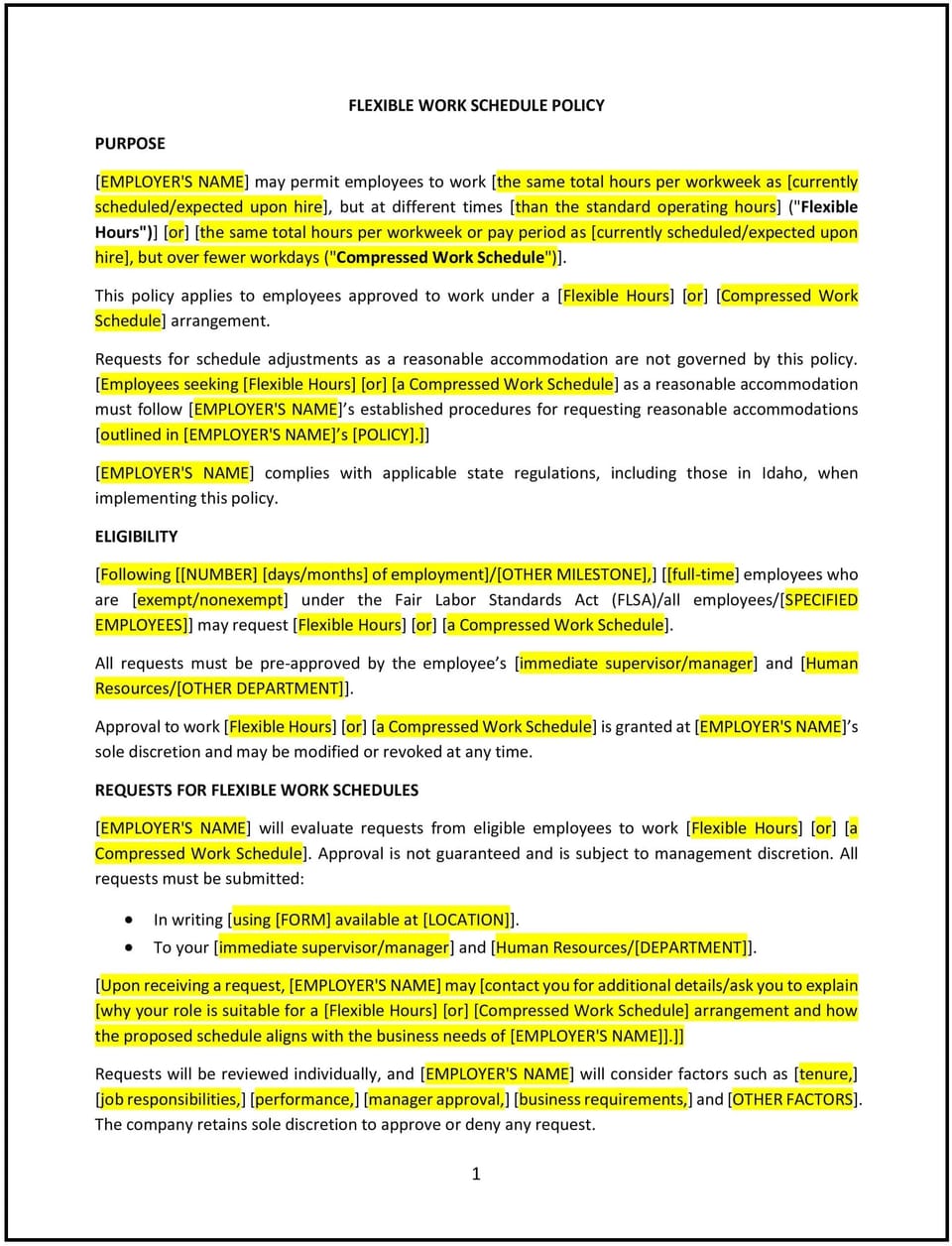Flexible work schedule policy (Idaho): Free template

Flexible work schedule policy (Idaho)
A flexible work schedule policy helps Idaho businesses establish guidelines for employees to adjust their work hours or locations to better balance personal and professional responsibilities. This policy outlines the types of flexible work arrangements available, eligibility criteria, and procedures for requesting and managing flexible schedules. It reflects the business’s commitment to supporting employee well-being and productivity.
By implementing this policy, businesses can enhance employee satisfaction, attract top talent, and maintain operational efficiency.
How to use this flexible work schedule policy (Idaho)
- Define flexible work arrangements: Specify the types of flexible schedules available, such as remote work, compressed workweeks, or flextime.
- Establish eligibility criteria: Outline the requirements for employees to qualify for flexible schedules, such as job role, performance, or tenure.
- Set expectations: Provide guidelines for maintaining productivity, communication, and availability during flexible work arrangements.
- Outline request procedures: Describe the steps for requesting a flexible schedule, including whom to notify, required documentation, and advance notice expectations.
- Address approval process: Specify who has the authority to approve flexible work arrangements and the factors considered in the decision.
- Communicate responsibilities: Ensure employees understand their responsibilities, such as meeting deadlines, attending meetings, and maintaining communication with their team.
- Review and update: Regularly review the policy to ensure it remains aligned with employee needs, business operations, and Idaho laws.
Benefits of using this flexible work schedule policy (Idaho)
This policy provides numerous benefits for Idaho businesses:
- Enhances employee satisfaction: Flexible work arrangements help employees balance personal and professional responsibilities, improving morale and job satisfaction.
- Attracts top talent: Offering flexible schedules can make the business more attractive to job seekers, especially those seeking work-life balance.
- Improves productivity: Employees with flexible schedules often experience reduced stress and increased focus, leading to higher productivity.
- Reduces absenteeism: Flexible work arrangements can help employees manage personal obligations, reducing unscheduled absences.
- Supports diversity and inclusion: The policy accommodates employees with varying needs, such as caregivers or those with long commutes, fostering an inclusive workplace.
- Encourages accountability: The policy holds employees accountable for maintaining productivity and communication during flexible work arrangements.
- Aligns with modern work practices: Flexible work schedules reflect contemporary workplace trends and can enhance the business’s reputation.
Tips for using this flexible work schedule policy (Idaho)
- Communicate the policy effectively: Share the policy with employees during onboarding, training sessions, and through internal communications to ensure awareness.
- Train managers: Ensure supervisors understand the policy, approval processes, and how to manage teams with flexible schedules.
- Monitor performance: Regularly review the productivity and engagement of employees on flexible schedules to ensure the policy is effective.
- Document arrangements: Maintain records of approved flexible work arrangements to ensure consistency and transparency.
- Encourage feedback: Create channels for employees to share their experiences and suggestions for improving the policy.
- Review the policy regularly: Update the policy as needed to reflect changes in employee needs, business operations, or Idaho laws.
- Lead by example: Encourage leadership to model flexible work practices and demonstrate a commitment to work-life balance.
Q: Why should Idaho businesses have a flexible work schedule policy?
A: A flexible work schedule policy helps businesses enhance employee satisfaction, attract top talent, and maintain productivity by supporting work-life balance.
Q: What types of flexible work arrangements are available?
A: The policy should specify options such as remote work, compressed workweeks, or flextime, depending on the business’s needs and employee roles.
Q: Who is eligible for flexible work schedules?
A: Eligibility typically depends on job role, performance, and tenure, as outlined in the policy.
Q: How should employees request a flexible schedule?
A: Employees should follow the request procedures outlined in the policy, including notifying their supervisor and providing any required documentation.
Q: How are flexible work arrangements approved?
A: The policy should specify who has the authority to approve requests and the factors considered, such as job responsibilities and team needs.
Q: What are employees’ responsibilities during flexible work arrangements?
A: Employees should maintain productivity, meet deadlines, attend meetings, and communicate effectively with their team, as outlined in the policy.
Q: How often should the policy be reviewed?
A: The policy should be reviewed annually or as needed to reflect changes in employee needs, business operations, or Idaho laws.
This article contains general legal information and does not contain legal advice. Cobrief is not a law firm or a substitute for an attorney or law firm. The law is complex and changes often. For legal advice, please ask a lawyer.


